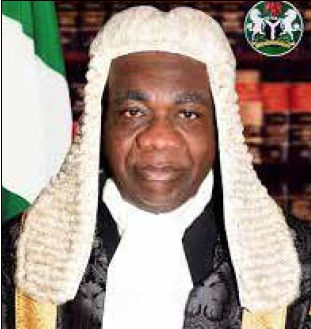In the Supreme Court of Nigeria
Holden at Abuja
On Friday, the 4th day of June, 2025
Before Their Lordships
Uwani Musa Abba Aji
Ibrahim Mohammed Musa Saulawa
Emmanuel Akomaye Agim
Chioma Egondu Nwosu-Iheme
Jamilu Yammama Tukur
Justices, Supreme Court
SC.266/2017
Between
GOVERNOR OF KEBBI STATE AND 12 ORS CROSS-APPELLANTS
And
1. ALH. AL-MUSTAPHA HARUNA JOKOLO
2. ALH. MUHAMMADU ILIYASU BASHAR CROSS-RESPONDENTS
(Lead Judgement delivered by Honourable Emmanuel Akomaye Agim, JSC)
Facts
On 13th September, 1995, the 1st Cross-Appellant appointed the 1st Cross-Respondent as the 19th Emir of Gwandu, pursuant to the powers conferred on him by Section 3 of the Chiefs (Appointment and Deposition) Law, Cap. 20, Laws of Northern Nigeria, 1963 and the Appointment of the Emir of Gwandu Order, 1995. However, on 3rd June, 2005, the 1st Cross-Appellant summarily deposed the 1st Cross-Respondent and appointed the 2nd Cross-Respondent in his stead as Emir of Gwandu.
Aggrieved, the 1st Cross-Respondent filed Suit No. KB/HC/14/2005: Alhaji Al-Mustapha Haruna Jokolo v Governor of Kebbi State & 13 Ors, at the High Court of Kebbi State to challenge his removal. The case of the 1st Cross-Respondent was that the 1st Cross-Appellant breached the principle of fair hearing by not affording him the opportunity to be heard, before deposing him from the throne.
Following the conclusion of trial and final addresses, the trial court delivered its judgement in which it granted the 1st Cross-Respondent’s claims, and made amongst other orders, an order setting aside his purported deposition and an order directing the 1st Cross-Appellant to reinstate the 1st Cross-Respondent as Emir of Gwandu.
Dissatisfied, the 1st Cross-Appellant and the 2nd Respondent appealed to the Court of Appeal. However, the Court of Appeal dismissed the appeal and affirmed the decision of the trial court. Thereafter, the 1st Cross-Appellant and other parties who were dissatisfied with the outcome of the appeal for varying reasons, filed different appeals in SC/2/2013; SC/314/2016; SC/1064/2024 and the instant cross-appeal at the Supreme Court. With the concurrence of all Counsel for the parties in the different appeals, the Supreme Court directed that since the Cross-Appeal deals with both the issues of lack of jurisdiction of the trial court and the merit of the case, the Court’s decision in the Cross-Appeal would bind the other sister appeals.
Issue for Determination
In determining the appeal, the Supreme Court considered the first issue raised by the Cross-Appellants, as follows:
Whether the proceedings conducted before the trial court and the court below without compliance with the precondition for the institution of a competent action by the 1st Cross-Respondent under the Chiefs (Appointment and Deposition) Law Cap. 21. Laws of Kebbi State 1996, were not null and of no effect whatsoever?
Arguments
Learned Senior Counsel for the Cross-Appellants argued that the 1st Cross-Respondent failed to comply with the condition precedent to the activation of the court’s jurisdiction provided in Section 4(3) of the Chiefs (Appointment and Deposition) Law, Cap. 21, Laws of Kebbi State 1996, which, according to Counsel, requires that any complaint or dispute arising from the appointment or deposition of a chief must first be submitted to the Governor for resolution before any court action can be initiated. Counsel submitted that the 1st Cross-Respondent did not make any representation to the Governor for possible resolution, prior to filing the suit at the trial court. Counsel for the Cross-Appellants contended that since the law had designated the Governor as the sole authority to determine such disputes in the first instance and the 1st Cross-Respondent did not follow this procedure, the suit was incompetent and the trial court lacked jurisdiction to entertain it. Counsel relied on the decision of the court in A-G KWARA STATE v ADEYEMO (2017) 1 NWLR (PT. 1546) PG 243-255 in support of his position.
In response, Counsel for the 1st Cross-Respondent argued that Section 4(3) of the Chiefs (Appointment and Deposition) Law only applies to disputes over the appointment of a chief or a head chief, and is not applicable to disputes over the deposition of a chief or a head chief, such as the present case where the challenge is as regards the 1st Cross-Respondent’s deposition from the throne of Emir of Gwandu. Counsel submitted further that, that it would be a breach of the rule of natural justice; nemo judex in causa sua to require the 1st Cross-Respondent to first refer the matter to the Governor, who was the very authority responsible for his deposition. Counsel also distinguished the case of AG KWARA STATE v ADEYEMO (supra) relied on by the Cross-Appellants, arguing that the dispute in that case was over a vacant stool and succession, unlike the instant case where the dispute is on deposition without compliance with the procedure laid down in Section 6 of the Kebbi State Chiefs (Appointment and Deposition) Law. Counsel submitted that the trial court validly exercised jurisdiction, in entertaining the 1st Respondent’s suit..
Court’s Judgement and Rationale
The Supreme Court held that it had since been established by the Apex Court in a long line of its decisions on chieftaincy disputes, in which provisions similar to Section 4(3) of the Kebbi State Chiefs (Appointment and Deposition) Law were applied, that a pre-action complaint or petition must first be made to the Governor in any dispute concerning the appointment or deposition of a chief before an action can be validly instituted in court. The Court cited its decisions in ARIBISALA v OGUNYEMI (2005) 6 NWLR (PT 921); A-G KWARA STATE v ADEYEMO (2017) 1 NWLR (PT 1546) 210; OLATIFU v AKOMOLAFE (2011) ALL FWLR as binding precedents under the doctrine of stare decisis. The Apex Court held that although it is absurd to require that a pre-action complaint be made to the same Governor that carried out the disputed deposition or appointment of a chief for review, the prevailing case law as established by the previous decisions of the Supreme Court on the point, is that a pre-action complaint or petition to the Governor must first be made before an action over a chieftaincy dispute can be filed in court, and the absence of a pre-action complaint or petition to the Governor before an action is filed is a feature that renders the action incompetent and robs the court of the jurisdiction to entertain it.
With particular reference to its recent decision in AGBODEMU & ORS v AGBOOLA & ORS (SC/169/2015), in a judgement delivered on 7th February, 2025, the Apex Court emphasised that the requirement to first approach the Governor forms part of a domestic grievance resolution process and does not violate the constitutional right of access to court, since it is not a final determination, but a mandatory preliminary step; hence, failure to comply with this condition precedent renders the suit incompetent and deprives the court of jurisdiction.
On the 1st Cross-Respondent’s submission that the requirement for pre-action complaint or petition to the Governor is only applicable to dispute over selection and appointment of a chief and not applicable to disputes over the deposition of a chief, the Supreme Court held that existing case law on this point has established that similar provisions apply to all chieftaincy disputes, regardless of whether the dispute involved the selection or appointment or deposition of a chief. The Court held further that the Apex Court while applying provisions exactly the same with Section 4(3) of the Kebbi State Chiefs (Appointment and Deposition) Law in OLATIFU v AKOMOLAFE (2011) ALL FWLR (PT.575) 292, had defined chieftaincy dispute as a dispute or question as to the validity of selection, appointment, approval of appointment, recognition, installation, grading, deposition or abdication of a chief.
The Supreme Court held that, in this instant case, the grant of the relief of the 1st Cross-Respondent for his reinstatement and reinstallation would be rendered illusory, sterile and academic without a concomitant grant of the relief for the setting aside of the appointment and installation of the 2nd Cross-Respondent as the 20th Emir. The Court held that, the deposition of the 1st Cross-Respondent and the appointment of the 2nd Cross-Respondent as the 20th Emir of Gwandu are intertwined and cannot be dealt with separately. The Court held further that the appointment of the 2nd Cross-Respondent was made upon the deposition of the 1st Respondent by the 1st Cross-Appellant pursuant to Section 4(2) of the Kebbi State Chiefs (Appointment and Deposition) Law that empowers the Governor to appoint a new chief to replace a deposed one, hence, it follows therefore that a pre-action complaint or petition to the Governor concerning the deposition of the 1st Cross-Respondent and the subsequent appointment of the 2nd Cross-Respondent as the 20th Emir of Gwandu ought to have been made before Suit No. KB/HC/14/2005 was commenced. The Supreme Court consequently found that the suit filed by the 1st Cross-Respondent was incompetent, thus, the exercise of jurisdiction by the trial court to entertain it as well as the judgement of the Court of Appeal affirming the trial court’s decision, were null and void.
In conclusion, the Supreme Court struck out Suit No. KB/HC/14/2005 for being incompetent, and set aside the judgement of the Court of Appeal.
Cross –Appeal Allowed on a Majority of 3:2
Dissenting Opinion of Honourable Uwani Musa Abba Aji, JSC and Honourable Ibrahim Mohammed Musa Saulawa, JSC
Their Lordships, Honourable Ibrahim M. Musa Saulawa and Honourable Uwani Musa Abba Aji, JSC, dissented from the majority decision, and opined that Section 4(3) of the Chiefs (Appointment and Deposition) Law of Kebbi State would apply only in situations where a dispute arises between two candidates to the throne who contested but one lost, and not to cases involving the deposition of an incumbent chief such as the instant case. Their Lordships reasoned that requiring a deposed chief to submit a pre-action complaint to the Governor who effected the deposition would violate fundamental principles of natural justice, particularly the rule against bias (nemo judex in causa sua) and the right to a fair hearing (audi alteram partem), and would also amount to an infringement of the 1st Cross-Respondent’s right of access to the Court. The Honourable Justices also opined that since the issue of non-service of pre-action notice was not raised at trial or at the Court of Appeal, it was too late to raise it on appeal. Their Lordships viewed that accepting the Cross-Appellants’ argument would effectively shield executive action from judicial scrutiny, allowing the Governor to act with impunity and still determine the legality of his own actions. In finality, the Honourable Justices opined that the failure to first submit a petition to the Governor did not render the 1st Cross-Respondent’s suit incompetent, and did not deprive the trial court of jurisdiction to entertain the claim.
Representation
Y. C. Maikyau, SAN; Abdullahi Yahya SAN; Wale Fapohunda, SAN with others for the Cross-Appellants.
Sylvester Imhanobe with others for the 1st Cross-Respondent.
Hussaini Zakariya, SAN with others for the 2nd Cross-Respondent
Reported by Optimum Publishers Limited, Publishers of the Nigerian Monthly Law Reports (NMLR)(An affiliate of Babalakin & Co.)


















Leave a comment